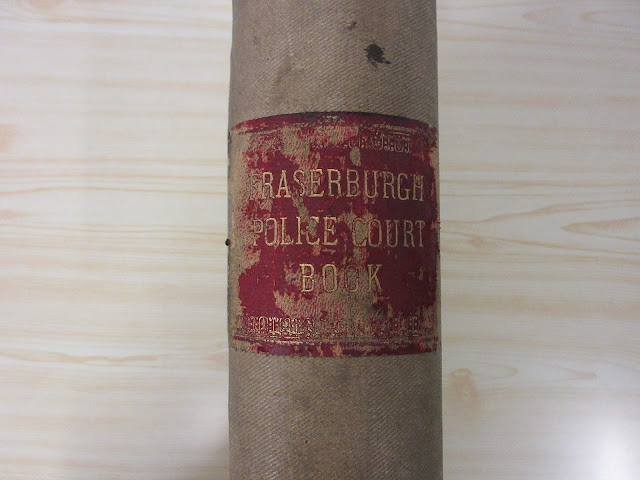Included in our collections are various Burgh and Police Court records, such as the Fraserburgh Court Book 1896-1904, which this post will detail entries from below.
Fraserburgh
Fraserburgh developed from a fishing village called Faithlie and was made a Burgh of Barony by Mary, Queen of Scots (1542 - 1567) in favour of Alexander Fraser, 7th of Philorth, in 1546. A burgh of barony was presided over by a feudal superior - in this case, the Frasers of Philorth - who had authority from the Crown to administer justice and to hold barony courts dealing with crimes and matters of good neighbourhood up to 1747 and thereafter solely matters of good neighbourhood. In 1601 it was raised a Burgh of Regality in favour of Alexander Fraser's grandson, Sir Alexander Fraser, 8th of Philorth, who was granted powers to found a University there (the institution survived until 1605).
Fraserburgh was created a police burgh in 1840 under the Burgh Police (Scotland) Act 1833 (3 & 4 Will. IV, c.46), a creation confirmed under the General Police and Improvement (Scotland) Act 1862 (25 & 26 Vict., c. 101). Burgh administration was carried out by police commissioners who were responsible for the cleansing, lighting, policing and public health of the burgh. The main industries in the town were fishing, particularly for herring, fish-processing and machine tooling. Under the Town Councils (Scotland) Act 1900 (63 & 64 Vict., c. 49) the police commissioners were replaced by Fraserburgh Town Council in January 1901.
Fraserburgh Police Court Book 1896-1904
 |
| AS/Afra/2/2 |
The offences in this court book range
from assault and theft to loitering on pavements. We will look at some of these offences in more detail.
The first name recorded in this volume is for George Robertson, who was a farmer from Invernorth. On 24 August
1896 he was arrested for assault. He forfeited his £2 bail, which means
that he failed to appear in court without a valid reason.

On 15 April 1901 Jessie James or Mowatt was arrested for contravention of sec 381 sub sec 36 of the Burgh Police Scotland Act (1892). This was a charge of littering. Jessie failed to appear in court and forfeited her bail of 5 shillings. She was the wife of Labourer John Mowatt and they lived at 82 High Street. If found in contravention of the sec 281 sub sec 10 of the Burgh Police Scotland Act of 1892, the offender was charged with blocking the road by causing horses to stand longer than necessary when unloading goods or passengers. Jane Stewart or Noble was charged with this offence on 26 April 1897. Jane pled not guilty and was subsequently convicted and 'admonished'. Essentially, she was given a verbal warning not to offend again. Jane resided at 38 College Bounds with her husband James Noble, who worked as a Fisherman.
John Copland a schoolboy and son of Jessie Copland (widow), residing at 19 Manse Street, was noted as committing 'malicious mischief' on 14 September 1896 along with two other schoolboys. His accomplices were James Cheyne, son of Shoemaker William Cheyne who lived at 33 Charlotte Street, and Francis Milne, son of George Milne, a Fishcurer living at 51 Saltoun Place. Malicious mischief equates to vandalism today. All were admonished and sent on their way.
Elizabeth McLachlan or Clark, a vagrant with no fixed abode, was arrested for being drunk and incapable on 23 April 1898. She pled guilty and was ordered to leave the town within half an hour of sentencing. Being ‘drunk and incapable’ is comparable to being charged with being drunk and disorderly today.
John McDonald, a pedlar residing on Main Street in Broadsea was sentenced to 24 hours in prison after pleading guilty to assault charges on 22 February 1898.
Pedlars Act 1871
The act allows (to this day) local police to grant a pedlar’s certificate when an application is made. According to Police Scotland “a pedlar is someone who trades as they travel…distinct from someone who merely travels to trade”; for example, a person who sells from a portable stand in a street could not claim to be a pedlar. According to the Pedlars Act 1871 the term pedlar means “any hawker, pedlar [or] petty chapman […] who, without any horse or beast […] travels and trades on foot and goes from town to town […] carrying to sell or exposing for sale any goods, wares or merchandise […] immediately to be delivered.” The Act made it illegal for people to act as a pedlar without a certificate and each district across the United Kingdom has a duty to keep a register of certificates.
Offence against section 4 of the Pedlars Act means that an individual is acting as a pedlar without a certificate. For this, they could be fined 2/6 or spend 24 hours in jail. On 15 July 1897, Margaret Anderson or Skinner was charged with this offence. Margaret was a vagrant with no fixed abode and pled guilty to the charges against her. She was fined 2 shillings and 6 pence or 24 hours in jail. It is likely that Margaret accepted the jail time as she was unemployed and homeless at the time of her conviction.
By Ashleigh Black, Archive Assistant











Comments
Post a Comment